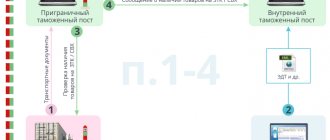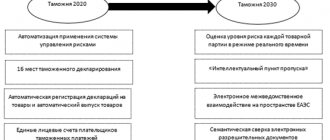Article 1
Introduce into subparagraph 7 of paragraph 1 of Article 35 of the Law of the Russian Federation of May 21, 1993 N 5003-I “On the Customs Tariff” (Gazette of the Congress of People's Deputies of the Russian Federation and the Supreme Council of the Russian Federation, 1993, N 23, Art. 821; Collection of Legislation of the Russian Federation Federation, 1995, N 32, Art. 3204; N 48, Art. 4567; 1996, N 1, Art. 4; 1997, N 6, Art. 709; 1999, N 7, Art. 879; N 18, Art. 2221; 2000, N 22, Art. 2263; 2002, N 30, Art. 3033; 2003, N 23, Art. 2174; N 28, Art. 2893; 2004, N 35, Art. 3607; 2005, N 52, Art. 5581; 2006, N 47, Art. 4819; 2007, N 49, Art. 6071; 2008, N 49, Art. 5748; 2009, N 1, Art. 22; N 26, Art. 3123; 2011, N 50, Art. 7351; 2013, N 40, Art. 5038; 2014, N 48, Art. 6647; 2015, N 48, Art. 6690; 2021, N 30, Art. 4536; 2021, N 18, Art. 2196 ) change, stating it as follows:
“7) the following goods received (produced) during the implementation by organizations that meet the requirements established by paragraph 1 of Article 33343 of the Tax Code of the Russian Federation, activities for the extraction of hydrocarbons at a subsoil site: crude oil (including oil and gas condensate mixture obtained due to the technological features of transportation of crude oil and stable gas condensate by pipeline transport), exported from the Russian Federation by the specified organizations, subject to submission to the customs authority of the confirmation specified in paragraph three of paragraph 13 of this article, or by other persons, subject to submission to the customs authority of the confirmation specified in paragraph three of paragraph 13 of this article article and paragraph four of this subclause (hereinafter referred to as confirmation). The goods specified in this subparagraph are exempt from export customs duties if, in relation to the subsoil area on which the corresponding goods are received (produced) as a result of hydrocarbon extraction activities, during the entire month in which such goods are exported from the Russian Federation goods, the following conditions are simultaneously met:
in relation to additional income from the production of hydrocarbon raw materials in such a subsoil plot, a tax on additional income from the production of hydrocarbon raw materials is calculated on the grounds specified in subparagraph 1 or 2 of paragraph 1 of Article 33345 of the Tax Code of the Russian Federation;
When calculating the mineral extraction tax in relation to oil extracted from such a subsoil plot, the coefficient Kg is applied, determined in the manner established by Article 3426 of the Tax Code of the Russian Federation, in an amount of less than 1.
In relation to the goods specified in this subparagraph, exported by other persons and declared in accordance with full declarations for goods, confirmation of an organization that meets the requirements established by paragraph 1 of Article 33343 of the Tax Code of the Russian Federation on the implementation in relation to the subsoil plot on which, as a result of activities for the extraction of hydrocarbon raw materials, the specified goods exported from the Russian Federation are received (produced), the conditions established by paragraphs two and three of this subclause are submitted in the form of an electronic document (electronic confirmation) simultaneously with the submission of a full declaration for the goods.
The electronic confirmation must contain information about the organization that meets the requirements established by paragraph 1 of Article 33343 of the Tax Code of the Russian Federation, as well as the name of the person to whom the confirmation is provided, the name of the subsoil area where the goods were received (produced), the number of goods received (produced) and transferred goods. The format and structure of the electronic confirmation are approved by the federal executive body exercising control and supervision functions in the field of customs;.”
Customs Tariff Law
The following are exempt from duty:a) vehicles carrying out international transportation of goods, baggage and passengers, as well as logistics and equipment, fuel, food and other property necessary for their normal operation while en route, at stopover points or purchased abroad in connection with the elimination of an accident (breakdown) of these vehicles;
b) items of material and technical supplies and equipment, fuel, food and other property exported outside the customs territory of the Russian Federation to support the activities of Russian vessels and vessels leased (chartered) by Russian persons, engaged in fishing, as well as their catches of aquatic biological resources and produced from these aquatic biological resources, fish and other products imported into the customs territory of the Russian Federation;
c) goods imported into the customs territory of the Russian Federation or exported from this territory for official or personal use by representatives of foreign states, individuals entitled to duty-free import of such items on the basis of international agreements of the Russian Federation or the legislation of the Russian Federation;
d) currency of the Russian Federation, foreign currency (except for that used for numismatic purposes), as well as securities in accordance with the legislative acts of the Russian Federation;
e) goods subject to conversion into state ownership in cases provided for by the legislation of the Russian Federation;
f) goods imported into the customs territory of the Russian Federation and exported from this territory as humanitarian aid; in order to eliminate the consequences of accidents and disasters, natural disasters; teaching aids for free educational, preschool and medical institutions;
g) goods imported into the customs territory of the Russian Federation as gratuitous assistance (assistance), as well as goods imported into this territory and (or) exported from this territory for charitable purposes through states, international organizations, governments, including for the purpose of providing technical assistance (assistance);
h) goods moved under customs control in transit through the customs territory of the Russian Federation and intended for third countries;
i) goods transported across the customs border of the Russian Federation by individuals and not intended for production or other commercial activities in accordance with the Customs Code of the Russian Federation;
j) ceased to be in force on January 1, 2005;
k) excluded from January 1, 1999;
l) ceased to be in force on January 1, 2005;
m) equipment, including machines, mechanisms, as well as materials included in the delivery package of the relevant equipment, and components (except for excisable ones) imported into the customs territory of the Russian Federation on account of loans provided by foreign states and international financial organizations in accordance with international treaties of the Russian Federation;
Exemption from customs duties is granted only in cases where this is provided for by international treaties of the Russian Federation.
o) has become invalid.
o) equipment for the production of baby food (components and spare parts for it), purchased at the expense of targeted funds from the federal budget, the analogues of which are not produced in the Russian Federation, according to the list approved by the Government of the Russian Federation, as well as equipment for the production of baby food (components and spare parts) parts thereto) acquired through related foreign loans provided to the Russian Federation by foreign states or governments of foreign states. This benefit applies to equipment (components and spare parts for it) for the production of baby food, imported (imported) into the customs territory of the Russian Federation for the purpose of implementing the federal target program “Development of the baby food industry” of the presidential program “Children of Russia”;
p) goods (equipment, including components and spare parts for it) in accordance with the list approved by the Government of the Russian Federation, imported (imported) into the customs territory of the Russian Federation under agreements (agreements, contracts), financing for which was opened before August 1, 1998 inclusive and was carried out at the expense of related loans from foreign governments, banks and firms attracted under guarantees of the Government of the Russian Federation.
c) ships registered in the Russian International Register of Ships. To provide the benefit provided for by this paragraph, within 45 days from the date of acceptance of the customs declaration, the declarant is obliged to submit to the customs authority a certificate of registration of the vessel in the Russian International Register of Ships and a copy of the document confirming payment of the state duty for registering the vessel in the specified register;
r) goods, with the exception of excisable goods, according to the list approved by the Government of the Russian Federation, transported across the customs border of the Russian Federation within the framework of international cooperation of the Russian Federation in the field of research and use of outer space, as well as agreements on services for launching spacecraft.
s) goods, with the exception of excisable goods, according to the list approved by the Government of the Russian Federation, transported across the customs border of the Russian Federation for their use for the purpose of holding the XXII Olympic Winter Games and XI Paralympic Winter Games of 2014 in the city of Sochi, subject to submission to the customs authorities of confirmation of the Organizational Committee of the XXII Olympic Winter Games and XI Paralympic Winter Games 2014 in Sochi, agreed with the International Olympic Committee and containing information on the nomenclature, quantity, cost of goods and organizations that import such goods.
t) Russian fishing vessels imported into the customs territory of the Russian Federation and exported from the customs territory of the Russian Federation, in respect of which work on major repairs and (or) modernization was carried out outside the customs territory of the Russian Federation, provided that the specified work was completed before 1 September 2008.
Law of the Russian Federation of May 21, 1993 No. 5003-1
1. Rates of customs duties are uniform and are not subject to change depending on the persons moving goods across the customs border of the Russian Federation, types of transactions and other factors, except for cases provided for by this Law.
2. The rates of import customs duties are determined by the Government of the Russian Federation.
In relation to goods originating from countries with which trade and political relations provide for most favored nation treatment, the rates of import customs duties established on the basis of this Law are applied.
In relation to goods originating from countries whose trade and political relations do not provide for most favored nation treatment, the rates of import customs duties established on the basis of this Law are doubled, except for cases where the Russian Federation provides tariff benefits (preferences) on the basis of relevant provisions of this Law.
For goods whose country of origin is not established, the rates of import customs duties applied to goods originating from countries with which trade and political relations provide for most favored nation treatment are applied, with the exception of cases provided for by the customs legislation of the Russian Federation.
(Clause as amended, put into effect on August 26, 2005 by Federal Law of July 21, 2005 No. 112-FZ - see previous edition.)
3. The rates of export customs duties and the list of goods to which they apply are established by the Government of the Russian Federation, unless otherwise established by this article. In relation to the goods specified in paragraph 4 of this article, the rates of export customs duties are established by the Government of the Russian Federation in the manner established in this paragraph (clause as amended, entered into force on September 10, 2001 by Federal Law of August 8, 2001 No. 126-FZ , – see previous edition).
4. This paragraph determines the procedure for establishing rates of export customs duties on crude oil (code TN VED of Russia 2709 00) and certain categories of goods produced from oil, the list of which is determined by the Government of the Russian Federation.
Rates of export customs duties on crude oil are established by the Government of the Russian Federation taking into account the average price of Urals crude oil on the world crude oil markets (Mediterranean and Rotterdam) for the last monitoring period and come into effect from the 1st day of the calendar month following the end of the monitoring period (paragraph as amended, entered into force on December 9, 2008 by Federal Law of December 3, 2008 No. 234-FZ - see the previous edition).
The Government of the Russian Federation monitors prices for Urals crude oil on the world crude oil markets (Mediterranean and Rotterdam) in order to determine the average price for the monitoring period.
The monitoring period for crude oil prices on the world crude oil markets (Mediterranean and Rotterdam) is the period from the 15th day of each calendar month to the 14th day of the next calendar month, inclusive, starting from October 15, 2008 (paragraph as amended from December 9, 2008 Federal Law of December 3, 2008 No. 234-FZ - see previous edition).
The paragraph has lost force since December 9, 2008 - Federal Law of December 3, 2008 No. 234-FZ. – See previous edition.
The rates of export customs duties on crude oil should not exceed the marginal duty rate, calculated as follows:
if the average price for Urals crude oil on the world crude oil markets (Mediterranean and Rotterdam) during the monitoring period is up to 109.5 US dollars per 1 ton (inclusive) - in the amount of 0 percent;
if the average price for Urals crude oil on the world crude oil markets (Mediterranean and Rotterdam) exceeds the level of 109.5 US dollars per 1 ton during the monitoring period, but not more than 146 US dollars per 1 ton (inclusive) - in the amount not exceeding 35 percent of the difference between the average price of this oil in US dollars per 1 ton established during the monitoring period and 109.5 US dollars;
if the average price for Urals crude oil in the world crude oil markets (Mediterranean and Rotterdam) exceeds the level of 146 US dollars per 1 ton during the monitoring period, but not more than 182.5 US dollars per 1 ton (inclusive) - in the amount , not exceeding the amount of 12.78 US dollars per 1 ton and 45 percent of the difference between the average price of this oil in US dollars per 1 ton established during the monitoring period and 146 US dollars;
if the average price for Urals crude oil in the world crude oil markets (Mediterranean and Rotterdam) exceeds the level of 182.5 US dollars per 1 ton during the monitoring period - in an amount not exceeding 29.2 US dollars per 1 ton and 65 percent of the difference between the average price of this oil in US dollars per 1 ton established during the monitoring period and 182.5 US dollars.
Rates of export customs duties on certain categories of goods produced from petroleum are established by the Government of the Russian Federation taking into account the average price of Urals crude oil on the world crude oil markets (Mediterranean and Rotterdam) for the last monitoring period and are put into effect from the 1st the date of the calendar month following the end of the monitoring period (paragraph as amended, put into effect on December 9, 2008 by Federal Law No. 234-FZ of December 3, 2008 - see the previous edition).
For certain categories of goods produced from oil, export customs duty rates are calculated according to formulas established by the Government of the Russian Federation.
The rates of export customs duties on crude oil and certain categories of goods produced from oil are established for a period of one calendar month (paragraph as amended, put into effect on December 9, 2008 by Federal Law No. 234-FZ of December 3, 2008 - see. previous edition).
Decisions of the Government of the Russian Federation on changes in the rates of export customs duties on crude oil and certain categories of goods produced from oil must be published in one of the official publications of the Russian Federation no later than one day before the date of entry into force of these decisions (paragraph as amended, entered into force on December 9, 2008 by Federal Law of December 3, 2008 No. 234-FZ - see previous edition).
(The clause was additionally included on September 10, 2001 by Federal Law of August 8, 2001 No. 126-FZ; as amended, put into effect on August 29, 2006 by Federal Law of July 27, 2006 No. 145-FZ - see the previous edition. )
5. The clause has lost force since June 10, 2003 - Federal Law of June 6, 2003 No. 65-FZ. – See previous edition.
What is the law?
The main theses of the Federal Law on Customs Tariffs:
- Regulations and justification for the application of rates;
- Procedure for calculating tariffs;
- Drawing up a list of goods on which duties are levied;
- Peculiarities of imposing duties on imported goods depending on the country of origin;
- The procedure for allocating tariff benefits, privileges, and quotas.
- R. 1 (Articles 1 – 5) – the main objectives of the law, the process of setting tariffs, etc.;
- R. 2 (Articles 6 – 11) – explanations on seasonal and specific duties;
- R. 3 (Articles 12 – 17) – description of the value of goods determined for the calculation of customs duties as the tax base;
- Sections 4 and 5 are no longer relevant;
- R. 6 (Articles 34 – 37) – provisions on tariff preferences;
- R. 7 (Article 38) – final aspects.
Classification of duties according to the law:
- Ad valorem - a tariff that is levied as a percentage of the customs value of the goods, regardless of its type and type;
- Specific - here, to calculate the duty rate, not a percentage of the price of the product is taken, but a fixed rate per unit in a mathematical definition (ton, kilogram, etc.);
- Combined tariff - combines the two previous ones.
Basic provisions of Law N 5003-1
The text of the law gives an idea of the key points addressed in the document. According to the contents of section I , the collection of a mandatory payment for the import/export of goods across the customs border is necessary for a number of the following reasons:
- As a factor in improving the composition of products that enter the territory of the Russian state;
- Correlations of norms between the volumes of exported and imported goods;
- Determining the ratio of the proportions of foreign exchange expenses and profits;
- Creating conditions for healthy competition with foreign importers;
- Improving the environment for the activity of domestic entities engaged in exports to enter international markets;
- Increments of government revenues.
Tariff regulations for mandatory customs payments are given in Art. 3. It establishes that the amount of the levied duty is constant and cannot be subject to modification at the initiative of importers and exporters.
The law allows for the possibility of introducing duty preferences for countries with which Russia has favorable partnership relations: they are allowed to use Customs Union tariffs. The size of tariffs in accordance with the register of goods is regulated by the government of the Russian Federation.
Federal Law of November 28, 2015 No. 324-FZ
RUSSIAN FEDERATION
THE FEDERAL LAW
On amendments to Articles 31 and 35 of the Law of the Russian Federation “On Customs Tariffs”
Adopted by the State Duma on November 20, 2015
Approved by the Federation Council on November 25, 2015
Article 1
Introduce into the Law of the Russian Federation of May 21, 1993 No. 5003-I “On the customs tariff” (Vedomosti of the Congress of People's Deputies of the Russian Federation and the Supreme Council of the Russian Federation, 1993, No. 23, Art. 821; Collection of Legislation of the Russian Federation, 1995, No. 32 , Art. 3204; No. 48, Art. 4567; 1996, No. 1, Art. 4; 1997, No. 6, Art. 709; 1999, No. 7, Art. 879; No. 18, Art. 2221; 2000, No. 22 , Art. 2263; 2002, No. 30, Art. 3033; 2003, No. 23, Art. 2174; No. 28, Art. 2893; 2004, No. 35, Art. 3607; 2005, No. 52, Art. 5581; 2006, No. 47, Article 4819; 2007, No. 49, Article 6071; 2008, No. 49, Article 5748; 2009, No. 1, Article 22; No. 26, Article 3123; 2011, No. 50, Article 7351; 2012, No. 50, Art. 6962; 2013, No. 30, Art. 4046; No. 40, Art. 5033, 5038; No. 44, Art. 5645; 2014, No. 48, Art. 6647) the following changes:
1) subparagraph 4 of paragraph 4 of Article 31 shall be stated as follows:
“4) if the average price for Urals crude oil on the world crude oil markets (Mediterranean and Rotterdam) exceeds the level of 182.5 US dollars per ton during the monitoring period - in an amount not exceeding 29.2 US dollars per 1 ton and 42 percent (for all calendar months falling on the period from January 1 to December 31, 2021 inclusive), 30 percent (for all calendar months falling on the period from January 1, 2021) of the difference between the average price established during the monitoring period specified oil in US dollars per 1 ton and 182.5 US dollars.”;
2) paragraph one of paragraph 12 of Article 35 should be stated as follows:
"12. Exemption from customs duties in respect of goods specified in subparagraph 6 of paragraph 1 of this article applies to goods received (produced) during the development of an offshore hydrocarbon deposit located on 50 percent or more of its area in the southern part of the Sea of Okhotsk (south of 55 degrees northern latitude), in the period until January 1, 2021, provided that the degree of depletion of reserves of each type of hydrocarbon raw material (except for associated gas) produced at such a field, as of January 1, 2015, is less than 5 percent, license for the right to use subsoil issued no later than January 1, 2009 and the initial reserves of natural combustible gas as of January 1, 2014 are no more than 170 billion cubic meters.”
Article 2
1. This Federal Law comes into force 30 days after the day of its official publication.
2. The provisions of Article 31 of the Law of the Russian Federation of May 21, 1993 No. 5003-I “On Customs Tariffs” (as amended by this Federal Law) are applied when determining the rates of export customs duties on crude oil and on certain categories of goods produced from oil, paid starting January 1, 2016.
President of the Russian Federation V. Putin
Moscow Kremlin
November 28, 2015
No. 324-FZ






